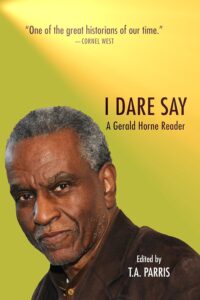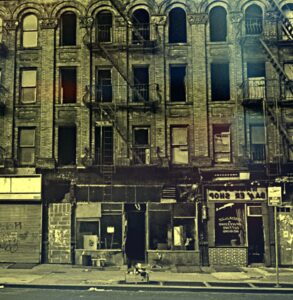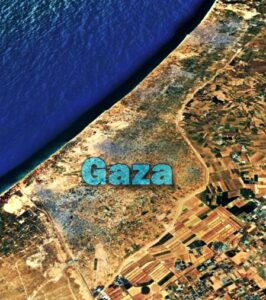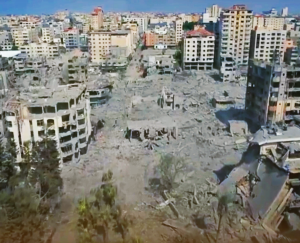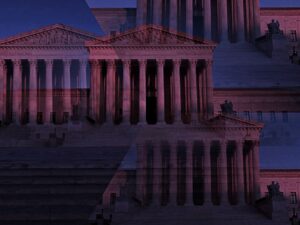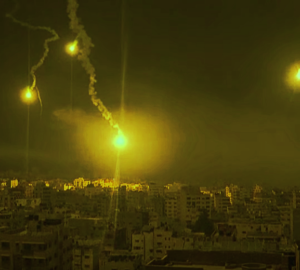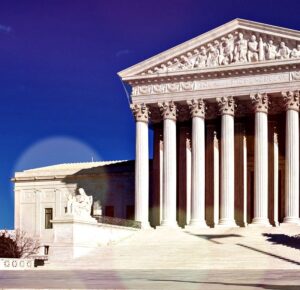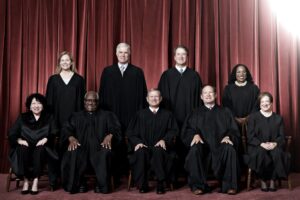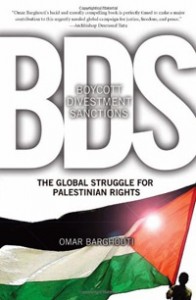Welcome to Law and Disorder Radio
Law and Disorder is a weekly independent civil liberties radio program airing on more than 150 stations and on Apple podcast. Law and Disorder provides timely legal perspectives on issues concerning civil liberties, privacy, right to dissent and practices of torture exercised by the US government and private corporations.
Law and Disorder March 25, 2024
Podcast: Play in new window | Download
I Dare Say: A Gerald Horne Reader
Angela Davis once stated “radical simply means grasping things at the root.” This makes understanding possible. What are the roots of our present dilemma? Where did capitalism come from? And what accounts for its great success? Where did racism come from? When was it implanted? Why are alternatives to the capitalist Democratic and Republican parties so feeble?
What did Malcolm X really stand for and what did he try to accomplish before he was assassinated at age 39, the same age that his contemporary Martin Luther King was assassinated five years later? How does this contribute to the weakness of our movement?
This weakness can be traced back most immediately to the anti-Communist witchhunt of the 1940s and 1950s and the destruction of the left-wing; of our once powerful trade unions beginning in 1947.
The danger that Malcolm X. presented to the powers that be are best understood by his internationalism, his reaching out to leaders in Africa, his desire to go to the United Nations to mobilize against American racism.
Today’s political activists are drawn to the works of historians to appreciate where we are at, how we got here, and what to do next.
Guest – Gerald Horne has written about these profound events. His reader I Dare Say has just been published by OR books. Cornell West called Gerald Horne is “one of the great historians of our time.“ Horne approaches his study of history as a politically engaged scholar with an insightful and necessary partisan stance. He graduated from both the University of California law school and Columbia University where he got his PhD in history. Horne has been active as a leader of the National Conference of Black Lawyers and is the author of 40 books as far reaching as the origins of capitalism, racism, settler colonialism, boxing and jazz. He is currently a chaired professor of African-American history at the University of Houston.
—-
Attorney Michael Deutsch on Repression of the Pro-Palestinian Movement
Historically, when the people of our nation rise up in massive opposition to policies and actions undertaken by their government that are deemed essential to its foreign or domestic policies, various governmental agencies invariably begin the process of trying to shut down or seriously weaken the peoples’ movements against those policies and actions. That’s what happened in the 1960’s and early ‘70’s, during the movement against the U.S. war in Vietnam. In the ‘60’s when the movement for civil rights was so active in our nation. Or more recently in response to the movement on behalf of immigrants’ rights. And so it is not surprising that the pro-Palestinian movement in the United States, which in the wake of how Israel is conducting its war in Gaza, has exponentially increased in size and in public view, would immediately become the focus of renewed governmental, as well as private, repression in America. Colleges and universities shut down groups like Students for Justice in Palestine and Jewish Voice for Peace; college presidents were called to testify before Congress about what they were, or were not, doing to combat alleged increases in anti-Semitism on their campuses; the U.S. House of Representatives initiated, and continues, an investigation of the pro-Palestinian movement; private employers have withdrawn job offers to students and others who joined the anti-Israel protests; and authors and speakers deemed too supportive of the Palestinian cause continue to be disinvited or banned from speaking at public forums.
Secrets And Lies: The Persecution Of Muhammad Salah
Often, governmental efforts to intimidate or undermine these peace and social justice movements include actions that are not visible to the general public. Secret actions. Actions such as sending undercover agents into the targeted protest groups in order to disrupt the group. Electronic spying on the groups and group leaders escalates. And, as the case with the movement now protesting Israel’s actions in its war in Gaza, a war backed by the United States both politically and militarily, various U.S. policing agencies are now consulting with, visiting with, and working in concert with governmental agencies in Israel.
Guest – Michael Deutsch, a lawyer with the famed human and civil rights People’s Law Office in Chicago, Illinois. Michael has also served as the Legal Director for the Center for Constitutional Rights in New York City. In the course of his career, he has been a criminal defense lawyer for the rebelling prisoners at Attica, and later was a coordinator in the Attica civil lawsuit where, after two decades of litigation there was a settlement of 12 million dollars in damages. Mr. Deutsch has also represented Black Panther Party members, Puerto Rican Nationalist prisoners in the 1950’s, who won an unconditional sentence commutation from President Carter in 1979; and more recently Michael represented Rasmea Odeh, the Deputy Director of the Arab-American Action Network, a former Palestinian prisoner and torture survivor.
——————————————-
Law and Disorder March 18, 2024
Podcast: Play in new window | Download
SCOTUS Oral Arguments Social Media Platforms
Earlier this month, the Supreme Court heard oral arguments about two different state laws that would regulate how large tech companies control what content can appear on their sites. The laws would compel companies to carry all users’ viewpoints and would preclude them from de-platforming political candidates. The Florida law at issue in Moody v. NetChoice and its Texas counterpart in NetChoice v. Paxton represent challenges by tech lobbying groups, NetChoice and the Computer and Communications Information Association. The plaintiffs claim the laws violate their First Amendment rights to make editorial choices about what content to permit or prohibit.
Most members of the Supreme Court seemed to indicate that, in some contexts, the Florida and Texas laws likely violate the First Amendment rights of the social media firms. They also expressed concern that blocking the laws entirely might go too far.
Republican legislators in the two states passed the laws aimed at what they say are efforts to stifle conservative voices on platforms like Facebook and YouTube. In part, the laws came about after platforms banned Donald Trump for violating their rules against inciting violence in his posts related to the Jan. 6, 2021 Capitol insurrection.
The plaintiffs assert that it will be virtually impossible for platforms to monitor and prevent hate speech, pro-terrorism advocacy and content that could harm children.
Potentially pivotal members of the court included conservative Amy Coney Barrett and her liberal counterpart Ketanji Brown Jackson. They said the correct course for the court was murky because large social media platforms play many different roles. While the platforms primarily curate speech crafted by users and enjoy broad First Amendment protection for doing so, the sites also provide services, like private messaging, that don’t involve much, if any, editorial supervision by the sites. Barrett and Jackson suggested that such services are similar to telephone or internet providers and can be subject to more government regulation.
Guest – Attorney and Professor Zachary Wolfe at George Washington University in Washington D.C.
—-
Robin Anderson on US-Israel Media Genocide Complicity
International humanitarian aid organizations have been documenting and warning that Israel was committing crimes of war after bombing Gaza after the October 7, 2023 Hamas attacks. Yet major media outlets and social media platforms have consistently ignored their on-the-ground reports.
As Israel’s attacks escalated into acts of genocide, corporate media coverage has largely framed such violence as defensive and justified. Glaringly absent has been reporting on Israel’s long-established use of violence and deprivation against Palestinians in Gaza, the West Back and Occupied East Jerusalem. As we’ve been covering on Law and Disorder, 50 years after Israel occupied the West Bank and Gaza Strip, it has systematically repressed and abused the rights of the Palestinian population. It is long recognized by most state and international bodies have long recognized that Israeli settlements are illegal under international law. Israeli violence has long been aggressive, a fact well documented but rarely discussed is establishment media.
What factors have contributed to Israel avoiding moral and legal culpability for its acts of genocide? As it turns out, there are many, from Israel employing propaganda, falsifying evidence, to the censorship and silencing of US journalists and commentators as well as repression of dissident voices online and off. And powerful Israeli lobbying forces have effectively silenced any criticism of Israel.
Guest – Robin Andersen is Professor Emerita of Media Studies at Fordham University. She writes media criticism for Fairness and Accuracy in Reporting (FAIR), and other outlets, and works with Project Censored as a contributor to the annual State of the Free Press book. Her work 0n the current Israeli bombing of Gaza has appeared in numerous publications. She is a guest columnist for Al Jazeera Arabic. Her book, A Century of Media, A Century of War, won the Alpha Sigma Nu book award in 2007. Robin’s Substack Page
Hosted by attorneys Michael Smith and Heidi Boghosian
——————————–
Law and Disorder March 11, 2024
Podcast: Play in new window | Download
Legal Analysis Of Recent Supreme Court Decisions
The U.S. Supreme Court, securely under the control of a Super Majority of 6 conservative Republican justices, three of whom were appointed by Donald Trump, continues to play a decisive role in undermining our constitutional democracy. This ominous trend continues based on three recent key cases, which we’ll be talking about today.
In one, the Court on March 4 rejected a lower court ruling that Trump was ineligible to run for president; in April the court will hear oral arguments on Trump’s claim of absolute immunity from criminal liability; and recently the Justices heard argument over whether social media sites had a right to ban Trump and others under their content moderation standards.
All of these cases arise from the insurrection on Jan. 6, 2021, when a mob of thousands stormed the US Capitol to prevent Joe Biden from being certified as President. That day, and for many months before and after, Donald Trump attempted to interfere with the constitutionally mandated process for the election of the President of the United States. Hanging in the balance of these three cases are some of the most momentous issues facing our democracy.
Guest – Stephen Rohde is a noted constitutional scholar and activist. He is the past Chair of the ACLU Foundation of Southern California; one of the founders and current Chair of Interfaith Communities United for Justice and Peace; and the author of American Words of Freedom and of Freedom of Assembly. Steve Rohde is also a regular contributor to the Los Angeles Review of Books, and to TruthDig, and a leader in the national campaign to free the imprisoned investigative journalist, Julian Assange.
—-
The Right To Boycott Israel
The First Amendment gives citizens the right to boycott, as well as the right to free speech and assembly and the separation of church and state. The right to boycott is under attack by right wing anti-democratic forces. Anti-boycott bills have been passed in 37 states so far. The main organization behind canceling our constitutional right to boycott Israel for its horrific crimes against Palestinians is the American Legislative Exchange Committee (ALEC). Its a well-funded right wing outfit with considerable power.
Today we speak with leading Palestine solidarity activist Felice Gelman. She helped produce and direct the five minute video called the Right to Boycott. It is a strategic tactic to oppose Israeli crimes against Palestinians.
The boycott started with the Boston Tea Party. The Montgomery Bus Boycott set off the civil rights movement in the south. The Grape Boycott supported Cesar Chavez and the farmworkers in California. The necessity of pushing back against Israel’s genocidal practices has never been more evident.
Guest – Felice Gelman is a coordinator of the Freedom2Boycott NYS Coalition, which has worked for a decade to defeat legislation penalizing boycotts in New York State and recently released a short film The Right to Boycott. She is a board member of the Friends of the Jenin Freedom Theatre, supporting The Freedom Theatre in the West Bank of Occupied Palestine. She was the co-producer of the first full length documentary filmed and directed by Palestinian filmmakers in Gaza, Where Should the Birds Fly?
Hosted by attorneys Michael Smith and Maria Hall
——————————
